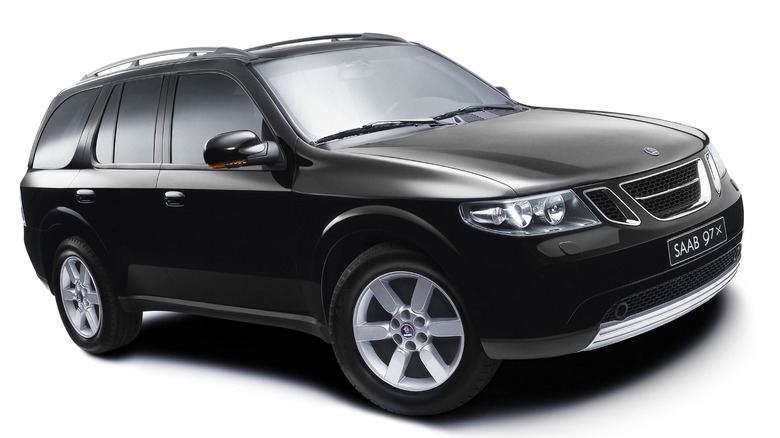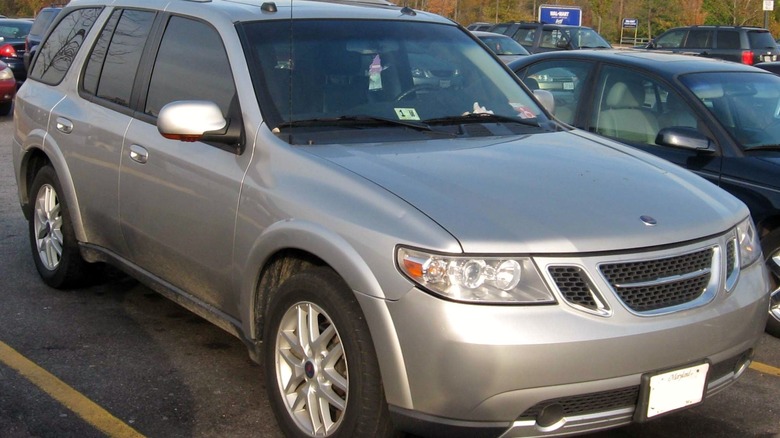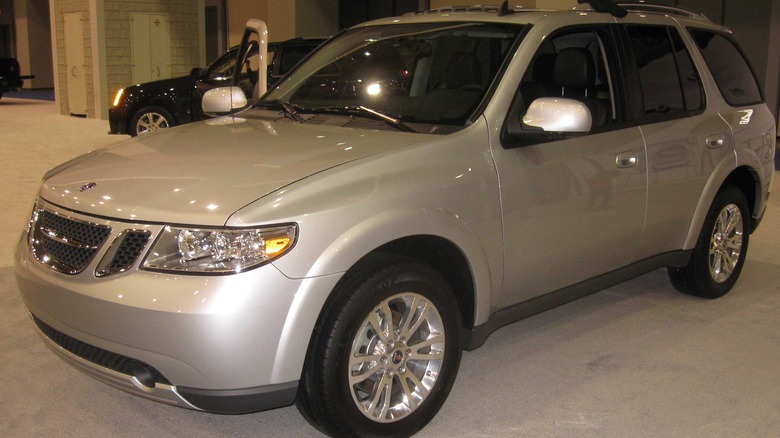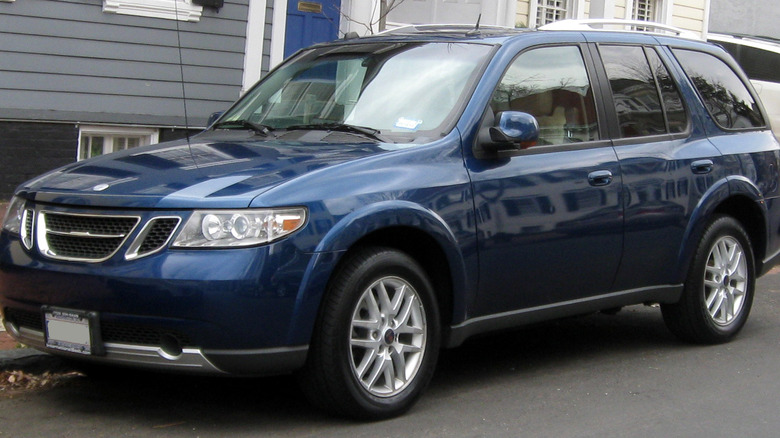Why Saab's 9-7x SUV Failed For General Motors
SUVs aren't typically the first type of vehicle that comes to mind when envisioning Saab. You likely picture a Saab 900 convertible or one of its many quirky variations. The Saab 9-7x, however, isn't your average Saab in multiple ways: It's a large SUV, it isn't really a Saab, and it could be equipped with a Chevy LS engine. This Saab came toward the end of the storied automaker's history when it was a wholly-owned subsidiary of General Motors.
In actuality, the Saab 9-7x was more closely related to the first generation of Chevy Trailblazer than anything even resembling the (formerly) Swedish brand's wacky little cars from years past. It bears a strong resemblance because it rides on the same GMT-360 platform and shares many mechanical components with the Chevy Trailblazer and GMC Envoy. For all intents and purposes, aside from a few suspension tweaks, the Saab 9-7x was a rebadged Chevy Trailblazer that spoke with a poorly mimicked Swedish accent.
Whether or not it's a "true Saab" is a larger question entirely. Regardless of your side of the "General Motors-ification" of Saab debate, you might be wondering why didn't the 9-7x soar like its namesake's fighter jets and what was it like to actually drive one.
A bad time for GM
The Saab 9-7x was offered for sale from 2005 to 2009, a relatively short period of time, considering it was Saab's first SUV. It may be easy to point the finger at Trailblazer underpinnings and fairly uninspired styling for the 9-7x's demise, but the story is deeper than that. To understand the death of the TrailSaab Blazer9-7x, you need to see what financial shape General Motors was in during the SUV's final years. To put it in technical terms, General Motors' general monetary outlook in 2008 and 2009 was "not good" and "historically bad." According to SEC filings in 2009, General Motors had managed to report a loss of a full six billion dollars over the first quarter of the year. It was like General Motors had suddenly forgotten how to make money. The truth is, no matter how good the Saab 9-7x might be, it likely wasn't going to be around very long anyway.
As one would expect, Saab was heavily involved in the financial foibles. If your filings to the federal government have a separate line item titled "Saab Related," you know things might be bad. Looking at the sales numbers gives a little more credence to the fact the 9-7 wasn't here to stay. In 2008, the last year that complete sales numbers are available, Saab sold a total of 3,150 9-7xs. Comparatively, GMC sold 21,864 Envoys and Chevy sold 68,235 Trailblazers. Sales were downright shameful. The rest of Saab only sold 16,187 cars.
A Scandinavian Chevy
It's been established that practically no one bought the 9-7x, but what actually made it tick? 2008 was the "best" year as far as engine choices went, yet none were unique to the Saab. You could option the SUV to have either a 285 horsepower 4.2-liter inline-six, a 300 horsepower 5.3-liter V8, or a 390 horsepower 6-liter LS2 V8 on the 9-7x Aero, a limited performance version that borrowed heavily from the Trailblazer SS.
Still, the vehicle wasn't particularly hateful to drive. Reviews from the time mention its better than average suspension and north of 300 horsepower from a big V8 is never a bad thing in most automotive applications, even one as bland as the 9-7x.
To make matters worse for the 9-7x, it was really expensive compared to its GM brethren, without offering much more. The base model in 2005 retailed for $38,990, which equates to about $60,716 in today's money. By comparison, the Chevy Trailblazer carried an MSRP of $26,465, or about $41,212 in 2023. A more refined suspension and a slightly different interior may technically set the 9-7x apart from the Chevy, but is it really worth dropping all that extra money for the privilege of driving a Saab? Probably not.
Never in it for the long run
The Saab 9-7x came at a bad time for both Saab and General Motors. If GM would have put more effort into distinguishing it from its mechanically identical brethren, maybe it would have sold a few more units, but given the fact Saab stopped producing cars entirely in 2010, it would probably have just prolonged the inevitable.
Today, the 9-7x is remembered as a weird Trailblazer clone that was fitted with a Chevy LS over the course of its very short life. While Saab's historic lineup brings back fond memories for many automotive enthusiasts, and the brand has attempted to come back from the dead on occasion, it's probably safe to say that the Saab 9-7x should stay in the history books, as a lesson to other automakers on how not to rebadge an SUV. While the 9-7x was not the sole cause of GM's financial crisis in the years surrounding 2008, it likely didn't help matters much.



